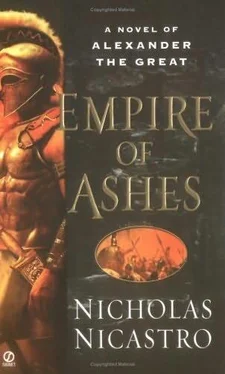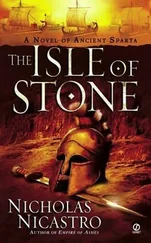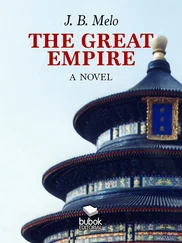Nicholas Nicastro - Empire of Ashes - A Novel of Alexander the Great
Здесь есть возможность читать онлайн «Nicholas Nicastro - Empire of Ashes - A Novel of Alexander the Great» весь текст электронной книги совершенно бесплатно (целиком полную версию без сокращений). В некоторых случаях можно слушать аудио, скачать через торрент в формате fb2 и присутствует краткое содержание. Жанр: Исторические приключения, на английском языке. Описание произведения, (предисловие) а так же отзывы посетителей доступны на портале библиотеки ЛибКат.
- Название:Empire of Ashes: A Novel of Alexander the Great
- Автор:
- Жанр:
- Год:неизвестен
- ISBN:нет данных
- Рейтинг книги:4 / 5. Голосов: 1
-
Избранное:Добавить в избранное
- Отзывы:
-
Ваша оценка:
- 80
- 1
- 2
- 3
- 4
- 5
Empire of Ashes: A Novel of Alexander the Great: краткое содержание, описание и аннотация
Предлагаем к чтению аннотацию, описание, краткое содержание или предисловие (зависит от того, что написал сам автор книги «Empire of Ashes: A Novel of Alexander the Great»). Если вы не нашли необходимую информацию о книге — напишите в комментариях, мы постараемся отыскать её.
Empire of Ashes: A Novel of Alexander the Great — читать онлайн бесплатно полную книгу (весь текст) целиком
Ниже представлен текст книги, разбитый по страницам. Система сохранения места последней прочитанной страницы, позволяет с удобством читать онлайн бесплатно книгу «Empire of Ashes: A Novel of Alexander the Great», без необходимости каждый раз заново искать на чём Вы остановились. Поставьте закладку, и сможете в любой момент перейти на страницу, на которой закончили чтение.
Интервал:
Закладка:
This victory caught Alexander by surprise. In his confusion, he didn’t know what he wanted to do with the prize, so instead turned the decision over to Thebes’s petty and resentful neighbors. They, of course, wanted the city razed to the ground. Alexander acceded to their selfishness-a decision he regretted for the rest of his life.
For later battles, Arridaeus was brought out on a horse, with an escort of mounted Companions around him to conceal his presence from the rest of the army. From this cocoon the simpleton sent orders around the battlefield. With each victory of Arridaeus, Alexander’s reputation for invincibility grew. Ever resourceful, Arridaeus added his brother’s renown to his arsenal, deploying Alexander like a psychological weapon. “Send Panic over there,” he would say, or “More Terror on the right.” The only thing that was more remarkable than his generalship was the Macedonians’ refusal to acknowledge it.
Machon paused as the jury turned in a body to the Macedonian spectators. They just stood, shaking their heads in vaguely menacing way, as if the defendant had sealed his fate with this testimony.
In any case, the Macedonians had their victory at the Granicus, and also managed to kill most of the Greeks fighting in the service of the Great King. Notice that, unlike Aeschines, I make a distinction between the two peoples. We kept hearing from him about the Greeks at Issus, the Greeks at Gaugamela. I assure you there were very few Greeks on campaign with Alexander in Asia, except for myself, and some Thessalian cavalry, who were held mostly in reserve anyway. The Macedonians have little use for Greeks except to kill them. Outrageous, you say? You would agree if you count the Greek casualties among the enemy at the Granicus and Issus. It is a fact that Alexander’s army killed more Greeks than anyone in history. By that I include Xerxes, Darius, or any other foreign king!
Now I know the Macedonians like to argue that the Greeks they slaughtered were all mercenaries, in the employ of the barbarian, and therefore traitors to their nation. But I ask you, who declared them criminals? They are our fellow citizens in exile, our luckless brothers, cousins, and sons. Who declared them expendable, when we still justly celebrate the exploits of the glorious Ten Thousand? Xenophon’s men were every one employed by Persian paymasters, all dirt-poor Peloponnesian riff-raff. Yet without the example of their survival in Asia, though grossly outnumbered, neither Philip nor Alexander would have dared invade the lands of the Great King. So I ask again, who declared their lives forfeit, and on what pretext? Spare me the sanctimony of this contempt for mere mercenaries!
As I have said, I will not revisit every word Aeschines has said, except to note that he has flattened the character of Alexander, who was a man in full, into something close to bas relief. Because he admired Athens and history so much, the King accepted me into his company as if I had always been there with him, in the opulent but cold palace in which he was born. His candor was astonishing. For example, when I asked him privately about the serious manner in which he drank, he told me it didn’t matter, since he expected to be dead by the age of thirty. Pressing him further on this, I learned that assassination was the acknowledged lot of Macedonian kings, with not a single one of his predecessors having died of old age. When he was somewhat deeper in his cups, I asked him why he bothered to go on campaign, if his future was so clouded.
“But that is exactly why I do go, my dear Machon! If I am killed in battle, I will deprive them of a king to murder!”
His replies on these matters were not always consistent. Sometimes he expressed the outright desire to die; others he aspired only to deprive his officers of the pleasure of killing him. Still others he showed an overwhelming sense of grief for the destruction of Thebes, which he believed was a sin that the gods would never forgive. He carried this fatalism to the battlefield with him, letting it drive him to acts of reckless valor. His enemies perceived this desperation in him, this assurance of his own death, and stepped aside. It was the unique combination of Arridaeus’s madness and Alexander’s despair that drove the success of the Macedonians. No army could cope with them both.
What I learned about him gives a different meaning to the old story about Alexander and his doctor. According to the legend, Alexander was suffering from sickness when he received a written warning from Parmenion that the royal doctor, Lycius, had been bribed by Darius to kill him. At the same moment Alexander read the letter Lycius was handing him an emetic to drink. The King, they say, cheerfully handed Parmenion’s warning to the doctor. Lycius read the accusation, and was preparing to deny it, when he saw that Alexander had already swallowed the drug! And although the stuff was foul, and was meant to sicken him to his stomach, the King did nothing more than soothe Lycius’s consternation, so sure was this innocent fellow that he would be executed.
This tale, which I have no idea is true, is supposed to show Alexander’s implicit trust in his men. What it may show instead is his faith in his own destruction. Recall these lines from Alcestis: “My mother was accursed the night she bore me, and I am faint with envy of all the dead.” Euripides, by the way, was always Alexander’s favorite poet; that he favored Homer is an outright lie perpetuated by Ptolemy.
Aeschines makes much of some documents found in the royal archives at Sardis. Please note that he presents none of the original records in evidence, but only letters from his dubious witnesses about what the records showed. Let the jury know that I deny knowledge of any payments to Demosthenes. They should also know that I have nothing to report about the records of the Great King at Sardis, because although I glimpsed them, I don’t read Akkadian or Elamite!
Alexander approached the unraveling of the Gordian knot as something of a stunt. The episode ended up as a fiasco that has somehow has been transformed into a triumph. Aeschines says that I encouraged him to attempt the puzzle in order to see him fail. The truth is that I argued with him not to offend the gods by presuming he could solve it. He replied that the challenge would teach him something about himself. We argued in his tent as he prepared to go, and our quarrel continued outside in front of witnesses, where I could not speak freely. At last I threw up my hands.
“Go ahead then! Bring the fury of heaven down on our heads!”
He posed with one hand behind the crown of his head, fingers wagging, like the wavering aura of some divinity.
“You forget who I am, my friend!”
Then he laughed, and was off to make a fool of himself. I anticipated disaster, but somehow couldn’t stay away from the spectacle.
The wagon of Gordion was kept in the shadow of Midas’s great funeral mound, in the Temple of Zeus: an ox cart of very common appearance, it was very much like the rude wains Alexander must have seen on his youthful maneuvers in the fields around Pella. Legend held that this was the very vehicle that had carried Midas’s father from his farmhouse in Macedonia to the throne of Phrygia. The Knot, a great ball of stripped bark, fastened the heavy double-yoke to the shaft. The man who untied it was destined to seize the throne of the Great King.
Standing in the back, I watched as Alexander circled the cart, quite possibly realizing the magnitude of the trouble he had taken upon himself. Generations of adventurers had tried and failed to untie the Knot. The entire population of Gordion seemed to be waiting outside the temple; the Macedonian officers were there too, their childish faith in their King yet unspoiled.
Читать дальшеИнтервал:
Закладка:
Похожие книги на «Empire of Ashes: A Novel of Alexander the Great»
Представляем Вашему вниманию похожие книги на «Empire of Ashes: A Novel of Alexander the Great» списком для выбора. Мы отобрали схожую по названию и смыслу литературу в надежде предоставить читателям больше вариантов отыскать новые, интересные, ещё непрочитанные произведения.
Обсуждение, отзывы о книге «Empire of Ashes: A Novel of Alexander the Great» и просто собственные мнения читателей. Оставьте ваши комментарии, напишите, что Вы думаете о произведении, его смысле или главных героях. Укажите что конкретно понравилось, а что нет, и почему Вы так считаете.












